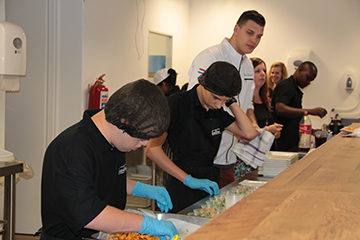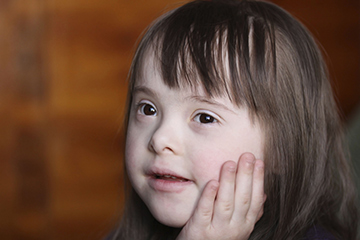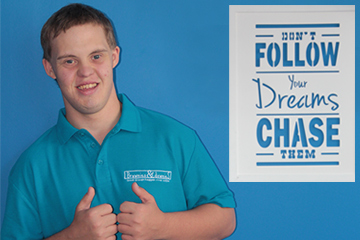World Down Syndrome Day 2016
Down syndrome is a chromosomal disorder arising at conception. It is a result of an extra number 21 chromosome (Trisomy 21), which causes delays in physical and intellectual development. However, the exact cause of Down syndrome is currently unknown.
World Down Syndrome Day is commemorated on the 21st day of the 3rd month every year. The date signifies uniqueness of the triplication (trisomy) of the 21st chromosome which causes Down syndrome.
 In South Africa we’ll be celebrating with the theme “My Friends, My Community” across the country. People with Down syndrome, must be able to enjoy full and equal rights with other people, both as children and adults. They need to be given the opportunity to participate fully in their communities.
In South Africa we’ll be celebrating with the theme “My Friends, My Community” across the country. People with Down syndrome, must be able to enjoy full and equal rights with other people, both as children and adults. They need to be given the opportunity to participate fully in their communities.
This year’s theme is embodied by a unique coffee shop and lunchroom, which recently opened in Cape Town. Brownies & downies is a non-profit organisation that creates awareness, employment and training for individuals with Down syndrome.
With the main aim of providing skills to individuals to be employable in the hospitality and service sectors, the facility encourages the public to interact with individuals who have an intellectual impediment. At the same time, it also provides individuals with an intellectual impediment with the opportunity to become independent and part of the broader community.
Visit them at Shop 7, number 2 Long Street, Cape Town or check out their Facebook page. You can use the hashtag #MyFriendsMyCommunity to discover more on social media.
Facts about Down syndrome
- People with Down syndrome have mild to moderate intellectual impairment.
- The cause of Down syndrome is not related to age, race, religion or socio-economic situations.
- It is estimated that 1 in 1 000 babies born in developed countries and 1 in 650 babies born in developing countries are affected by Down syndrome.
- 80% of children affected by Down syndrome are born from mothers under the age of 35, although women over the age of 35 are at a higher risk of having a child with Down syndrome.
- Children with Down syndrome can be included in regular schools with regular academic procedures.
- Although Down syndrome cannot be cured, people with this condition thrive from loving homes, appropriate medical care, early intervention, as well as educational and vocational services.
- Due to advanced medical care, the majority of people born with Down syndrome have a life expectancy of approximately 55 years.
Prenatal screening
Detecting Down syndrome in a foetus is a two-step process, this involves firstly a screening for risk and then a diagnostic test to determine if the detection truly exists.
Screening methods:
There are a number of ways to identify high-risk pregnancies. This is usually done by measuring the mother's blood levels of certain proteins and hormones, and the use of ultrasound to scan nuchal translucency - the thickness of a layer of fluid that forms near the neck of a developing foetus. Too much liquid is often a sign of Down syndrome.
Importance of early intervention
The first patterns of learning and behaviour influencing development are laid down in a child's early years. There are certain critical periods during a child's early years when he/she is most responsive to learning experiences. A child's environment and learning experiences have a major effect on development and learning. Both greatly influence the degree to which a child reaches his/her full potential.
Parents usually need help in establishing constructive patterns of parenting a young child with a disability. Providing adequate care, stimulation and training for their child during the critical early years when basic developmental skills should be acquired, can be cost effective.
Your right as a parent
Down Syndrome South Africa doesn’t consider the this condition a reason for termination of pregnancy. However, it remains the parents' choice.
School options for Down syndrome learners
Public schools must admit Down syndrome learners and serve their educational requirements without unfairly discriminating in any way. They may not administer any test related to the admission of a learner to a public school. Ordinary schools must make every effort to provide education for learners with special educational needs, making sure that these learners have the support that they require. It is not enough for the school just to accept the child. The school must support the child's needs as well.
Services which we provide
Tygerberg Hospital offers a weekly Down syndrome support group, which is run by the Down syndrome Association, offers early developmental stimulation and support to parents.
At Red Cross War Memorial Children's Hospital, very specific services are offered for children who have Down syndrome and their families. The Toy Library, which is situated in close proximity to the Developmental Clinic, attends to children with Down syndrome as well as their caregivers, from birth until they start school. Appointments are made on a monthly basis in accordance to the children's age, so that the families of same aged children meet with each other once a month when attending the Toy Library. This encourages the development of parent support groups, where they share stories with each other, and often provide solutions within their own peer group.
The Speech Therapy Department at the Red Cross War Memorial Children's Hospital, runs a speech therapy clinic in the Toy Library for all attending children. Speech delay is very common in children who have Down syndrome. It is also one of the areas that parents have most concern. The speech therapist does both individual and group therapy sessions, where children and their caregivers participate in activities as are seen in educare and pre-school settings, using aids such as music and reading materials, encouraging turn-taking and general social skills development.

For more information on Down syndrome, advice and support contact:
Down Syndrome South Africa
Telephone: 0861 369 672 (0861-DOWNSA)
Fax: 011 252 5323
E-mail: dssaoffice@icon.co.za
Website: www.downsyndrome.org.za
Down Syndrome Association Western Cape
Telephone: 021 919 8533
Fax: 021 919 8266
Email: info@downwc.co.za
Please see World Down Syndrome Day for more information.
Important Contacts
Toy Library (Red Cross War Memorial Children's Hospital)
Tel: 021 658 5610


